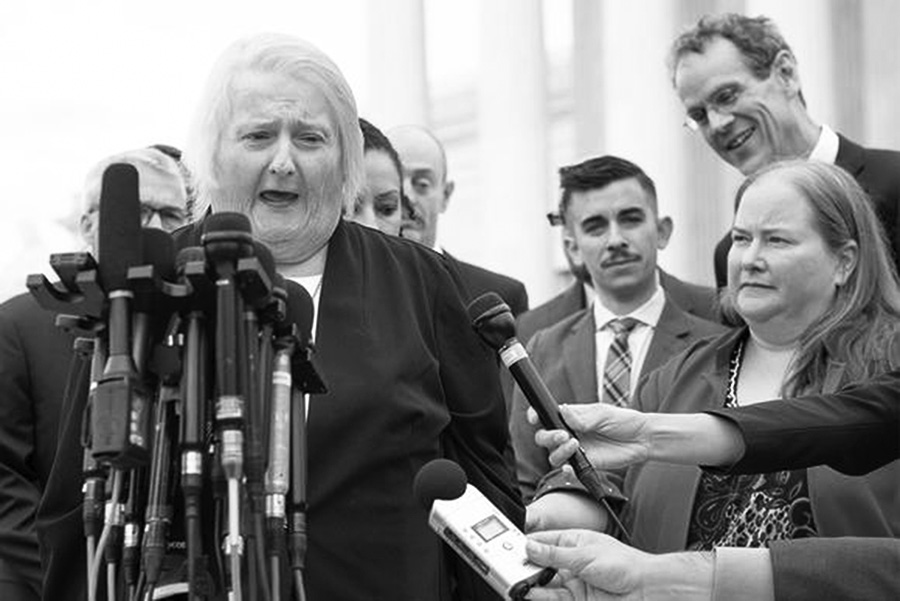Donna Cartwright
Posted October 12, 2020
The death of Justice Ruth Bader Ginsburg and her probable replacement by the much more conservative Judge Amy Coney Barrett highlight the continued precariousness of steps toward LGBTQ equality. Those developments are a reminder that the self-organization and mobilization of the LGBTQ community and its allies are a surer path to equality than reliance on legal structures.
The Supreme Court’s June decision in three employment discrimination cases brought by LGBT people marked a huge step forward. The court ruled that job discrimination based on employees’ sexual orientation or gender identity necessarily violates Title VII of the Civil Rights Act of 1964, which forbids discrimination based on sex.

The employment discrimination decision came five years after the Court’s ruling that denial of the right to marry to LGBTQ people was unconstitutional. Many queer people and their allies saw the 2020 decision as long overdue, since state and lower federal courts had made similar decisions decades ago.
Much remains to be done before we see anything like a truly equal playing field for queer people. The June decision was limited to Title VII, which covers employment discrimination; it does not cover education, jury service, health care and housing, although cases relating to those areas may soon follow.
And in view of the relatively weak social support [the “social wage’’} provided by the U.S. federal, state and local governments, much more is needed for traditionally disadvantaged and excluded segments of the population, such as people of color, women, people with disabilities, etc. And now a rightward tilted court may well slow progress toward that goal.
The demobilization and dismantling of much of the LGBTQ community’s political and organizational infrastructure in the last few years (see my article “The Queer Movement Today” in Against The Current #184) leaves us all more vulnerable.
The social disruption brought about by the COVID-19 pandemic is a case in point, for both LGBTQ people and others. Marginalized people are often the worst hit by social disasters, and this year’s outbreak is no exception. People who are unemployed or only sporadically employed have less access to health insurance, and therefore, to health care. The pathological system of employer-based health insurance that predominates in the United States ensures that the most vulnerable will be the most poorly served.
And insurance isn’t the only obstacle. According to the National Center for Transgender Equality, 23% of trans people who needed a medical provider didn’t seek one because of concern about discrimination or disrespect. Another 33% decided to forgo treatment because they couldn’t afford it.
Just a week before the Supreme Court decision on LGBTQ employment rights, the Trump administration finalized a regulation that removed protection for transgender people against sex discrimination in health care. While this action seems to fly in the face of the Supreme Court’s June decision, it is hard to predict what will happen in the courts.
Meanwhile, reproductive health care and trans health care are often being deemed “nonessential.”
Marginalized people, both LGBTQ and straight, are being pushed into the underground economy. Sex workers, both trans and non-trans, face grave danger from contagion, and those who are incarcerated are often put in shared cells that don’t respect their gender identity. Precarious living arrangements increase the danger of domestic violence, from families as well as partners.
The efforts of right-wing anti-LGBTQ politicians, who tried over the last few years to pass state laws preventing trans people from using public restrooms, only to see their most prominent efforts fail, have shifted their focus to preventing young trans people from obtaining life-affirming and sustaining treatment that could give them a much better start in life. At least nine such bills have been introduced or are planned this year.
LGBTQ people and their allies need to remain vigilant and mobilized to resist and overcome both anti-trans prejudice and the more pervasive inequality that dominates our society.
A concluding thought – during oral arguments last autumn on the cases that were decided in June, Justice Gorsuch, apparently concerned that those who are scorned and victimized by society might turn the tables, warned that prohibiting such discrimination could lead to “massive social upheaval.” Apparently mollified, he later wrote the majority opinion upholding LGBTQ employment rights.
Nevertheless, I would have to say: Massive Social Upheaval? Bring it On!!
An earlier version of this article appeared in Against the Current No. 208, September/October 2020 here.
